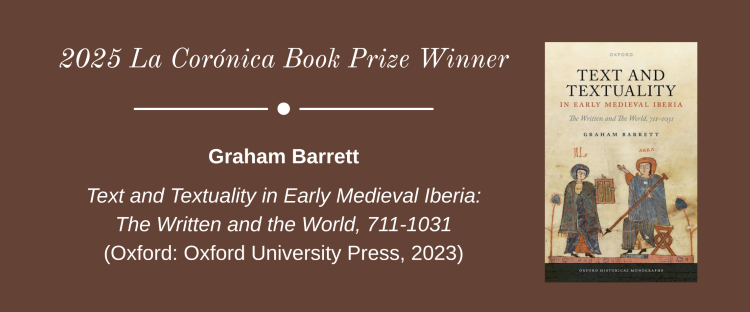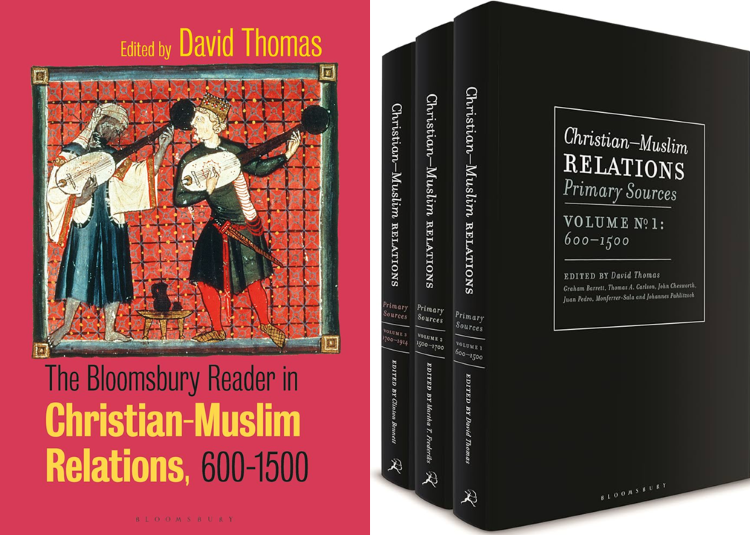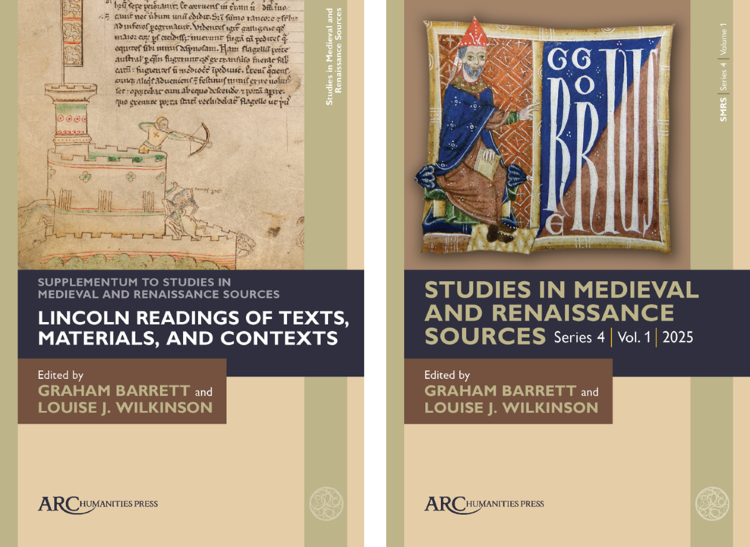Staff profile
Dr Graham Barrett
Assistant Professor (Early Medieval European History)

| Affiliation | Telephone |
|---|---|
| Assistant Professor (Early Medieval European History) in the Department of History | |
| Member of the Institute of Medieval and Early Modern Studies |
Biography
I joined the Department of History at Durham in September 2024 as Assistant Professor of Early Medieval European History. I am a social and cultural historian of language and literacy in the early medieval Iberian Peninsula and Mediterranean world, interested fundamentally in the life of the written in the world, or the biography of text: who used it and how, for what ends and with what consequences, the points and modes of intersection and interaction between text and society and culture. My work also encompasses transcultural exchange between Christians and Muslims, and Classical reception bridging the medieval and early modern worlds through digital humanities.
Before coming to Durham, I was educated at the University of Toronto (BA (Hons) in History and Latin, Victoria College, 2007) and the University of Oxford (MSt in Medieval History, Balliol College, 2008; DPhil in History, Balliol College, 2015). While a doctoral student, I won research fellowships at King's College London and the Institute of Historical Research (2011-12), before election to a Junior Research Fellowship at St John's College, Oxford (2012-16). I moved to the University of Lincoln as Lecturer in Roman History and Material Culture (2016-18), then Senior Lecturer in Late Antiquity (2018-24). I also hold Fellowships of the Higher Education Academy (2018-) and the Royal Historical Society (2023-).
I have given a number of public lectures on aspects of my research, including 'The written and the world in early medieval Iberia' in Madrid, 'The pope as pontifex maximus: tracing a title from Numa Pompilius to James I' in London, and 'Language choice and cultural identity in late antique and early medieval Iberia / Elección de lengua e identidad cultural en la Iberia tardoantigua y altomedieval' in Estella-Lizarra, Navarra (in English y en español).
Text and Textuality in Early Medieval Iberia
One strand of my research into the biography of text concerns the intersection and interaction of text with society and culture. My first monograph, Text and Textuality in Early Medieval Iberia: the Written and the World, 711-1031 (Oxford: Oxford University Press, 2023), is a study of functions and conceptions of writing and reading, documentation and archives, and the role of literate authorities in the Christian kingdoms of the northern Peninsula between the Muslim conquest of 711 and the fall of the Islamic caliphate at Córdoba in 1031. Surveying the 4,095 surviving Latin charters from the period, it addresses both materiality, tracing the lifecycle of charters from conception and composition to preservation and reuse, and connectivity, delineating a network of text through my own painstaking identification of 2,000 citations of documents, secular and canon law, the Bible, liturgy, and monastic rules.
What I reconstruct is 'textuality', or how the authority of the written and the structures enabling its use framed and constrained social action and cultural norms. What I propose is a new model of early medieval reading: by citing texts, charters circulated fragments of those texts, and we need to rethink the relationship of sources to their audiences fundamentally to accommodate such fragmentary transmission. This is the textuality of imperfect knowledge; we confront early medieval books as discrete and integral, and interpret them so, but for many if not most of their audience, those who lived with and by them, they were known as scattered fragments.
Text and Textuality in Early Medieval Iberia received the 2025 La Corónica International Book Award, and to date has been reviewed favourably in Early Medieval Europe, Francia Recensio, Hispania Sacra, and Studia Historica: Historia Medieval.

Latin and Latinity in Late Antique Iberia
The second strand of my research mirrors my monograph on Latin literacy, exploring the intersection and interaction of society and culture with text through a focus on the Latin language. One major recent example is ‘Conservatism in Language: Framing Latin in Late Antique and Early Medieval Iberia’, in Alex Mullen and George Woudhuysen (eds), Languages and Communities in the Late-Roman and Post-Imperial Western Provinces (Oxford: Oxford University Press, 2023). Here I explain the long-term stability of written Latin in the multilingual context of the Peninsula by reversing the model of Romance speech interfering with text, asking instead what effects text had on spoken Latin via the reading of writing aloud. The articles on the global discourses of Latin which I co-edited with Oren Margolis as Latinity after Antiquity. Eranos: Acts Philologica Suecana (2021) similarly explore how Christians in North Africa, high medieval notaries, Renaissance and early modern scholars, Jesuit missionaries in India, and Austro-Hungarian nationalists negotiated in differing ways a constant package of imperial implications attaching to the language.
Christian-Muslim Relations: Source Readers
The first two strands of my research converge in the third, which investigates text as a site of intersection and interaction between societies and cultures. One element of this is interfaith dialogue, and as a part of the global ‘Christian-Muslim Relations’ project led by David Thomas, I co-edited both The Bloomsbury Reader in Christian-Muslim Relations (London: Bloomsbury Academic, 2022) and Christian-Muslim Relations: Primary Sources, 1. 600-1500 (London: Bloomsbury Academic, 2023), scholarly readers which introduce and translate materials illustrating Christian and Muslim engagement, in peace and enmity, across the Mediterranean and Islamicate worlds during the Middle Ages.

Work in Progress: Annotated Translations
Another element of this third strand is the process whereby Christian authors adopted and adapted Classical genres, confronting and changing their expectations. Such textual negotiations define the three volumes of translations and commentaries which I am currently under contract to publish: (1) with George Woudhuysen, the Austrasian and Visigothic letter collections, preserving public and private correspondence from late antique Iberia and Gaul, for Translated Texts for Historians; (2) the De viris illustribus tradition of bio-bibliography from Jerome, Gennadius of Marseille, and Isidore of Seville down to the tenth century, also for Translated Texts for Historians; and (3) with David Ungvary, the complete verse and prose of Eugenius of Toledo (d. 657), which is a bridge between ancient and medieval poetic arts, for the Routledge Later Latin Poetry series.
Studies in Medieval and Renaissance Sources
To champion the core historical approach of working outwards from the evidence, I have also co-founded with Louise J. Wilkinson a new journal, entitled Studies in Medieval and Renaissance Sources, which provides a forum unique in the Anglophone world for scholars to publish new readings of evidence from 400 to 1600. It is dedicated to the 'nuts and bolts' scholarship of analysis and interpretation led by direct engagement with the sources – written, visual, material – in any form, from editions, translations, and commentaries to reports, notes, and reflections. By foregrounding the most basic approach of working outwards from the evidence, it aims to foster conversations across disciplines, regions, and periods, as well as to become a reference point for original approaches and new discoveries. The first volume, Lincoln Readings of Texts, Materials, and Contexts (Leeds: Arc Humanities Press, 2024), is now available in open access, and the second is in production.
We welcome submissions for future issues, which can be sent directly to my email address.

Current Teaching (2024-25)
This academic year I am teaching the following modules:
HIST1701 Transformations in the Late Antique Mediterranean, c. 300-c. 700
HIST21R1 Early Medieval Iberia: from Conquest to Caliphate, 409-1031
HIST46730 The City in History
Esteem Indicators
- 2023: Royal Historical Society: Fellowship
- 2018: Higher Education Academy: Fellowship
Publications
Authored book
- Text and Textuality in Early Medieval Iberia: the Written and the World, 711-1031Barrett, G. (2023). Text and Textuality in Early Medieval Iberia: the Written and the World, 711-1031. https://doi.org/10.1093/oso/9780192895370.001.0001
Book review
- Windows on Justice in Northern Iberia, 800–1000. By Wendy Davies. Abingdon and New York: Routledge. 2016. xii + 291 pp. £115. ISBN 9781409464730.Barrett, G. (2019). Windows on Justice in Northern Iberia, 800–1000. By Wendy Davies. Abingdon and New York: Routledge. 2016. xii + 291 pp. £115. ISBN 9781409464730. Early Medieval Europe, 27(1), 140-144. https://doi.org/10.1111/emed.12320
Chapter in book
- (Re-)Introducing Studies in Medieval and Renaissance Sources: A New Journal (Series) with an Old PurposeBarrett, G., & Wilkinson, L. J. (Eds.). (2025). (Re-)Introducing Studies in Medieval and Renaissance Sources: A New Journal (Series) with an Old Purpose. In Studies in Medieval and Renaissance Sources 4.1 (2025) (pp. 1-3). Arc Humanities Press.
- Ordeal by Innocents: the Law and Liturgy of Trial by Water in Early Medieval IberiaBarrett, G. (2024). Ordeal by Innocents: the Law and Liturgy of Trial by Water in Early Medieval Iberia. In G. Barrett & L. J. Wilkinson (Eds.), Lincoln Readings of Texts, Materials, and Contexts (pp. 187-235). ARC Humanities Press.
- Introducing Studies in Medieval and Renaissance Sources. A Statement of PurposeBarrett, G., & Wilkinson, L. J. (2024). Introducing Studies in Medieval and Renaissance Sources. A Statement of Purpose (G. Barrett & L. J. Wilkinson, Eds.; pp. 1-6).
- Conservatism in Language: Framing Latin in Late Antique and Early Medieval IberiaBarrett, G. (2023). Conservatism in Language: Framing Latin in Late Antique and Early Medieval Iberia. In A. Mullen & G. Woudhuysen (Eds.), Languages and Communities in the Late-Roman and Post-Imperial Western Provinces (pp. 85-125). https://doi.org/10.1093/oso/9780198888956.003.0004
- Justus Heurnius, Admonition on Undertaking the Gospel Mission to the IndiesBarrett, G. (2023). Justus Heurnius, Admonition on Undertaking the Gospel Mission to the Indies. In M. Frederiks (Ed.), Christian-Muslim Relations: Primary Sources, 2. 1500-1700 (pp. 254-258).
- Sourcebook Entries (12)Barrett, G. (2023). Sourcebook Entries (12). In D. Thomas, J. P. Monferrer-Sala, J. Palitzsch, T. Carlson, & G. Barrett (Eds.), Christian-Muslim Relations: Primary Sources, 1. 600-1500 (pp. 259-62,270-73,278-81,291-4,304-6,314-17,332-5,335-8,349-51,354-6,377-80,385-9.).
- Empire and the Politics of Faction: Mérida and Toledo RevisitedBarrett, G. (2023). Empire and the Politics of Faction: Mérida and Toledo Revisited. In D. Fernández, M. Lester, & J. Wood (Eds.), Rome and Byzantium in the Visigothic Kingdom: Beyond Imitatio Imperii (pp. 277-315).
- Promoting Active Engagement with Text-Based Resources in Large First-Year Modules in HistoryBarrett, G., Chandler, J., Wood, J., & East, M. (2022). Promoting Active Engagement with Text-Based Resources in Large First-Year Modules in History. In A. M. Farrell & A. Logan (Eds.), Pedagogy for Higher Education Large Classes (PHELC): Proceedings of the Fourth PHELC Symposium (pp. 40-44). Dublin City University. https://doi.org/10.5281/zenodo.7045749
- Dictionary Entries (27)Barrett, G. (2022). Dictionary Entries (27). In A. Louth (Ed.), The Oxford Dictionary of the Christian Church (pp. Vol.1:1-2,264,313,533,684,890,1041;Vol.2:1104-6,1134,1135,1168,1466,1467-8,1524,1543,1581,1672,1710-11,1721,1792,1796-7,1822-5,1872-3,2029,2031-2,2035-6.). https://doi.org/10.1093/acref/9780199642465.001.0001
- Sourcebook Entries (6)Barrett, G. (2022). Sourcebook Entries (6). In D. Thomas, J. P. Monferrer-Sala, T. Carlson, J. Pahlitzsch, & G. Barrett (Eds.), The Bloomsbury Reader in Christian-Muslim Relations, 600-1500 (pp. 217-20,224-7,235-8,251-4,270-73,295-8.).
- Hispania at Home and AbroadBarrett, G. (2020). Hispania at Home and Abroad. In S. Barton & R. Portass (Eds.), Beyond the Reconquista: New Directions in the History of Medieval Iberia (711-1085). In Honour of Simon Barton (pp. 52-119). https://doi.org/10.1163/9789004423879_004
- God’s Librarian: Isidore of Seville and His Literary AgendaBarrett, G. (2019). God’s Librarian: Isidore of Seville and His Literary Agenda. In A. Fear & J. Wood (Eds.), A Companion to Isidore of Seville (pp. 42-100). https://doi.org/10.1163/9789004415454_004
- Dictionary Entries (38)Barrett, G. (2018). Dictionary Entries (38). In O. Nicholson (Ed.), The Oxford Dictionary of Late Antiquity (pp. Vol.1:41-2,167,197,220,262,318-19,326,379,416,482,532-3,564,607,637,663,670,726,751-2,762,790;Vol.2:890,896-7,914-15,926-7,1047,1156,1291,1368,1406-9,1454-5,1475-6,1507,1569-71,1577.). https://doi.org/10.1093/acref/9780198662778.001.0001
Edited book
- Studies in Medieval and Renaissance Sources 4.1 (2025)Barrett, G., & Wilkinson, L. J. (Eds.). (2025). Studies in Medieval and Renaissance Sources 4.1 (2025). Arc Humanities Press.
- Lincoln Readings of Texts, Materials, and Contexts: Supplementum to Studies in Medieval and Renaissance SourcesBarrett, G., & Wilkinson, L. J. (Eds.). (2024). Lincoln Readings of Texts, Materials, and Contexts: Supplementum to Studies in Medieval and Renaissance Sources. Arc Humanities Press. https://doi.org/10.1353/book.129307
- Christian-Muslim Relations: Primary Sources, 1. 600-1500Barrett, G., Thomas, D., Monferrer-Sala, J. P., Pahlitzsch, J., & Carlson, T. (Eds.). (2023). Christian-Muslim Relations: Primary Sources, 1. 600-1500.
- The Bloomsbury Reader in Christian-Muslim Relations, 600-1500Barrett, G., Thomas, D., Pedro Monferrer-Sala, J., Carlson, T., & Pahlitzsch, J. (Eds.). (2022). The Bloomsbury Reader in Christian-Muslim Relations, 600-1500.
- Latinity after Antiquity [Special Issue: Eranos Acta Philologica Suecana,112]Barrett, G., & Margolis, O. (Eds.). (2021). Latinity after Antiquity [Special Issue: Eranos Acta Philologica Suecana,112]. Svenska Klassikerförbundet.
Journal Article
- The Social Context of the Charter: Times and Places of Documentation in Early Medieval Iberia (711-1031)Barrett, G. (2023). The Social Context of the Charter: Times and Places of Documentation in Early Medieval Iberia (711-1031). Studia Historica. Historia Medieval, 41(2), 9-33. https://doi.org/10.14201/shhme2023412933
- Reading through the Pandemic: Promoting Active Digital Engagement with Text-Based ResourcesBarrett, G., East, M., Fitzgibbons, J., Vescovi, M., & Wood, J. (2023). Reading through the Pandemic: Promoting Active Digital Engagement with Text-Based Resources. IMPact: E-Journal of Higher Education Research, 6(2), 1-30.
- Latinity: Rhetoric and Anxiety after AntiquityBarrett, G., & Margolis, O. (2022). Latinity: Rhetoric and Anxiety after Antiquity. Eranos: Acta Philologica Suecana, 112, 1-26. https://doi.org/10.33063/er.v112i.6
- Towards a Trans-Regional Approach to Early Medieval IberiaBarrett, G., Carvajal Castro, Á., Marques, A. E., Agúndez San Miguel, L., Castro Correa, A., Fernández Ferreiro, M., Jarrett, J., Peterson, D., Quetglas Munar, R., Sánchez Pardo, J. C., Santos Salazar, I., & Tomás Faci, G. (2022). Towards a Trans-Regional Approach to Early Medieval Iberia. History Compass, 20(6), Article e12743. https://doi.org/10.1111/hic3.12743
- The Text of Visigothic Law in PracticeBarrett, G. (2020). The Text of Visigothic Law in Practice. Visigothic Symposia, 4, 18-63.
- Remigius and the “Important News” of Clovis RewrittenBarrett, G., & Woudhuysen, G. (2016). Remigius and the “Important News” of Clovis Rewritten. Antiquité Tardive, 24, 471-500. https://doi.org/10.1484/J.AT.5.112639
- Assembling the Austrasian Letters at Trier and LorschBarrett, G., & Woudhuysen, G. (2016). Assembling the Austrasian Letters at Trier and Lorsch. Early Medieval Europe, 24(1), 3-57. https://doi.org/10.1111/emed.12132
Other (Digital/Visual Media)
- Present and Precedent in the Church Councils of Late Antique Iberia (RHS Historical Transactions)Barrett, G., & Wood, J. (2024, September 13). Present and Precedent in the Church Councils of Late Antique Iberia (RHS Historical Transactions). Historical Transactions - Royal Historical Society Blog [Blog Post].
- The Classical Association: a Brand New Branch!Barrett, G. (2023, May 11). The Classical Association: a Brand New Branch! The Classical Association Blog [The Classical Association].
- Perspectives on Classics: Classical Studies at the University of LincolnBarrett, G. (2022, September 12). Perspectives on Classics: Classical Studies at the University of Lincoln [Bulletin of the Council of University Classics Departments].

